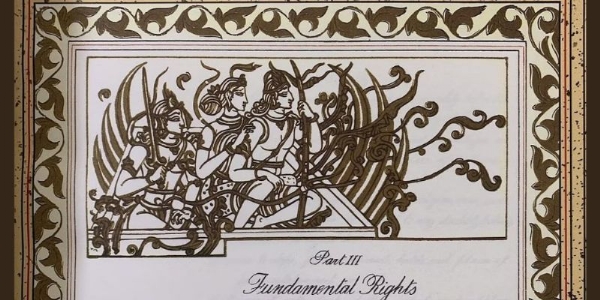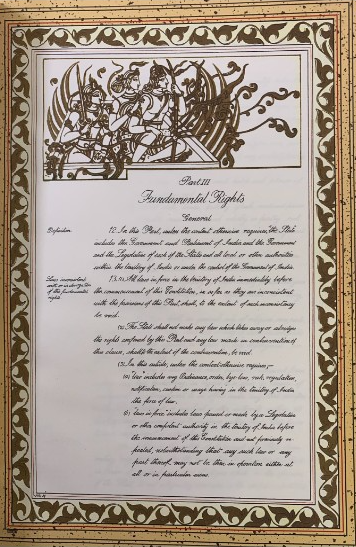Ayodhya, Reflection of Deep Commitment to Constitution
Total Views |
While Ram Janma Bhoomi temple in Ayodhya is a manifestation of Hindu unity and restoration of self-esteem, an equally important factor that emerged from Ayodhya is the deep faith of people in the constitution. All the parties involved in the prolonged struggle were unanimous that they would abide by the judicial decision. The parties involved kept their word. The Modi government needs to be appreciated for the reason that it also showed restraint even though it enjoys a majority to pass any legislation. Deep faith in the constitution and behaviour by it, can largely be attributed to the psyche of the Bharatiya people.

Ayodhya is probably the only case in modern history where a major civil issue is settled amicably. Two Abrahamic religions – Christianity and Islam - have a history of conflict for centuries. The conflict between these two religions, which is normally described as a ‘crusade’, was the determining factor of geographical and political changes in Europe and Asia. The world still witnesses sequels of the conflict between Jews, Christians, and Islam. The recent war between Israel and Hamas is the extension of this conflict. Bharat, on the other hand, never made any aggression on any country. It never resorted to political expansionism. However, the influence of Bharat across the world is still palpable because of its ideological influence and strength.
People of Bharat need to be congratulated as the 'Pranpratishtha’ ceremony at Ayodhya passed off peacefully, without having any untoward incident. Peaceful ceremonies in Ayodhya took place when the world was experiencing two wars – Russia-Ukraine and Israel-Hamas. The Ayodhya ceremony occurred amid a volatile situation in the world and it can be described as the most meaningful lesson to the world by this ancient nation, which beliefs in 'Vasudhaiv Kutumbam’.
Ram Janma Bhoomi issue was the most complicated issue in the post-independence era because of its religious character, with possible international ramifications. Ayodhya was a complicated issue as it had a history of struggle for five centuries, leaving serious wounds on the Hindu psyche. In independent Bharat, the battle was mostly judicial and legal, even though it was fundamentally a mass movement. Of course, we have a few notorious elements, which tried to manipulate the judicial course of action and propagate false propaganda but it had very little or negligible impact. Such notorious elements exposed themselves by trying to set some different narrative against the popular will.
The silver lining of the movement is that the people agree to respect judicial verdicts, which is an important constitutional mechanism. This could happen as people have deep faith in the constitution. Any document, particularly like the constitution, is meaningless unless the people, who want to follow it, have certain qualities. These human qualities are determined by DNA and culture. Documents like the constitution, prove attractive only on papers if they are not supported by human energy. As a result, such documents fail to bring about any change in human life and are restricted only to academic discussion.

The Indian constitution is one of such document, which is strongly supported by intellectual and emotional qualities, which are required for the success of the constitution. Judiciary, Parliament, and Executive are vital organs in the constitution of Bharat. A major feature of the constitution is the ‘theory of separation of powers’ because the chance of any one organ becoming dominant is minimized. In the Ayodhya case, all three organs did not overstep and stuck to their role by respecting the constitution. The judiciary played a major role in the Ayodhya movement and its decision was respected by the entire country. executive needs to be appreciated as the BJP government, led by Narendra Modi, showed restraint. This is significant as BJP was the only party, which had unequivocally supported Ram Janma Bhoomi temple in Ayodhya. The Modi government could enact the required laws with the help of numerical strength in both houses of Parliament. However, the BJP restrained itself from taking such a step. BJP consistently said that the government would abide by the judicial judgment, showing its faith in the constitution. Similar stands were taken by other Hindu organizations, which were involved in the Ayodhya movement from the beginning.
The most appreciable part is that the Muslim community, by and large, expressed its faith in the judiciary or constitutional mechanism. Three major incidents – the Supreme Court decision in November 2019, Bhumipoojan in August 2020, and the ‘Pranpratishtha’ ceremony in January 2024 – took place in the recent past and all of them passed off peacefully, demonstrating that people of this country respect the constitutional mechanism.
Sociologists need to think seriously about unusual self-restraint shown by the people instead of unnecessary political shouting in the name of secularism. The terms ‘secular’ and `socialist’ were incorporated in the preamble during the period of emergency and they are not part of the original constitution. Constitution makers do not feel it necessary to include these terms as they were fully aware of the Bhartiya mindset. Bhartiya philosophy has deep roots in Antyodaya and does not need to learn anything from socialism. Bhartiya philosophy has deep roots in tolerance and openness, which are prerequisites for democracy. Spirituality is the outstanding feature of Bharat, which respects all the ways of worship. Therefore, Bharat does not need to declare itself as ‘secular’. Bharat continues to be a democratic country despite several obstacles as it has sustained the Hindu psyche despite heavy odds. Distinguished features of Bharat can be understood if one looks at the countries, which got freedom along with Bharat. They have turned into an autocratic political setup due to a lack of basic human qualities, which are needed to run a democratic setup.
For the people of Bharat, democracy does not mean numerical strength. It goes far ahead of numerical strength wherein respecting the opposite view, reassessment of one’s view, and accommodating the opposite view, are integral parts. This, one can also term as ‘spiritual democracy’ as it requires a great amount of matured mindset. It is because of this mindset that Bharat survived despite all the attacks and invasions for centuries. It is because of this mindset that Bharat calls itself a dynamic and eternal nation. And who are the people who possess this mindset? Thy are undoubtedly Hindus, who decisively shape the mindset of this nation. This mindset certainly plays a major role in respecting and adherence to the constitution, which was reflected in the Ayodhya movement.
Self-restraint, which is one of the essentials of democracy, was experienced when a temple was being built at Ram Janma Bhoomi. Self-restraint or 'Swa-niyaman’ is also one of the oldest virtues of Bhartiya philosophy. The people of Bharat were never dependent upon political power, unlike the two Abrahamic religions. They have their mechanism or structure, which is less dependent upon political power. It is for this reason that the Bharatiya civilization sustained despite having political slavery for years. 'Ashram Vyavastha', described in Bhartiya philosophy, is based on self-rule, which necessarily implies restraint. Therefore, the restraint shown in the Ayodhya movement is also not a new phenomenon to the people of Bharat.
All these qualities make the people of Bharat exclusively different from the rest of the world. Qualities like tolerance, respecting other views, openness, self-restraint, and self-rule are basic qualities for a healthy democracy and the success of the Constitution. All these qualities are inseparable from the Hindu ethos of this nation, which has shaped the Bharatiya psyche. This attitude was reflected in the Ayodhya movement in the form of respect for the constitution.
Therefore, the success of the constitution can be attributed to human qualities, which Bharat has possessed since ancient times. The Constitution itself is the expression of ancient Bharatiya philosophy, which shaped our psyche. Western political ideas like justice, liberty, equality, fraternity, sovereign, socialism, and democracy were never new to the people of Bharat. Bharat has been preaching and practicing these ideas when the Western world was living in the primitive age. The success of the Ayodhya movement is a reflection of deep faith in constitutional values, which have origins in ancient Hindu philosophy.


